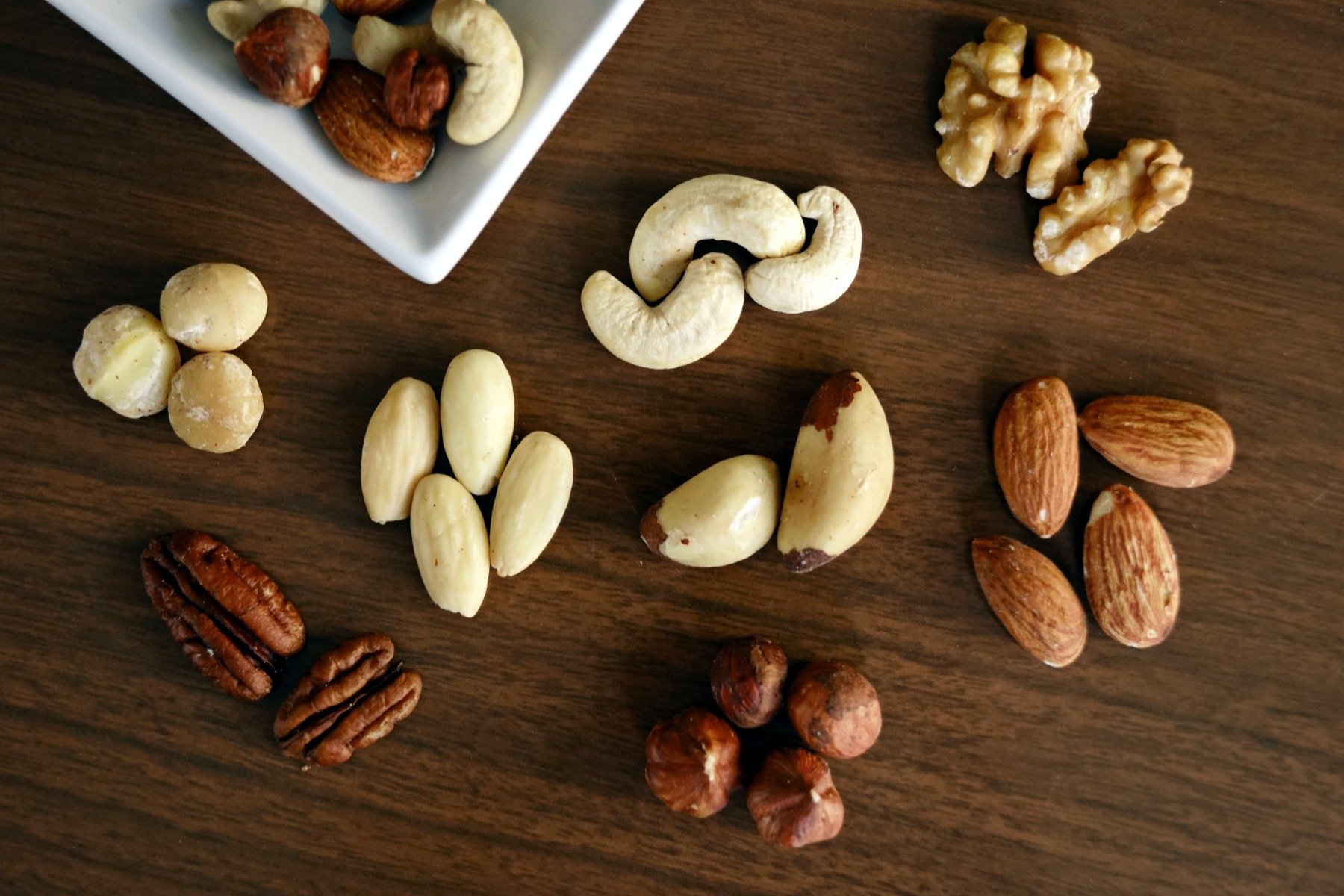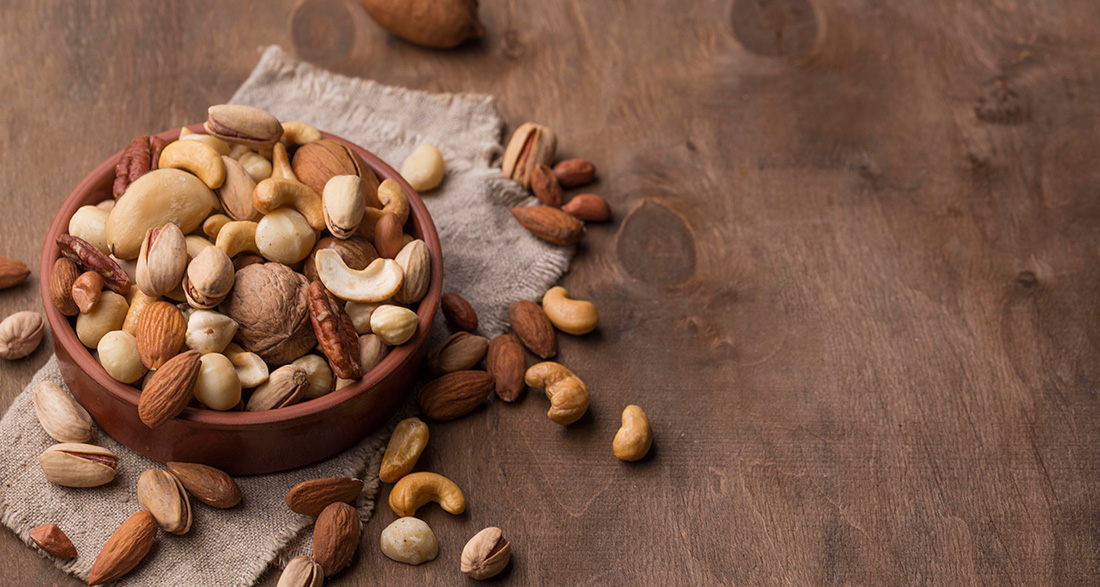For us humans, nuts are considered very healthy. In addition to rich fatty acids, they provide us with many minerals and vitamins. Since nuts are natural products, one might think that they would also be suitable for dog nutrition. But is that really true? We will now explain which nuts dogs are allowed to eat and which ones they should avoid.
Do Nuts Belong in Everyday Dog Nutrition?
In terms of “healthy dog nutrition,” attention must be paid primarily to macro- and micronutrients. Because, in addition to proteins and carbohydrates, dogs also need saturated and unsaturated fatty acids, vitamins, minerals, and trace elements. While nuts can provide our dogs with some fatty acids and vitamins, they are not an essential part of our pets’ healthy diet. Essential fatty acids and micronutrients can also be obtained through a complete, balanced dog food or (when BARFing) through a species-appropriate bowl.
Nuts also contain a lot of phosphorus, which, alongside calcium, is an essential mineral for bones and teeth. However, an excess of phosphorus can significantly increase the risk of kidney disease in dogs. In case of doubt (e.g., in case of pre-existing conditions), you should first consult your veterinarian. They can tell you exactly whether and which nuts you can feed your dog and in what amount.
Balance is key:
Beware of the fat content There are nuts that dogs should not eat due to their ingredients. However, even harmless nuts should only be fed in moderation, as they have a high-fat and calorie content.
Which Nuts Are Toxic to Dogs?
Some types of nuts are an absolute taboo for dogs. They contain substances that can cause severe poisoning and even death, and should therefore be avoided.
The following nuts should never be fed to dogs:
- Nutmeg: Even in small quantities, nutmeg is toxic to your dog, causing intoxication, vomiting, seizures, and disorientation.
- Macadamia: Macadamia nuts are pure poison for your dog, causing paralysis, weakness, uncontrolled twitching, vomiting, and fever.
- Bitter Almonds: Bitter almonds contain a 5% share of amygdalin. This small dose is sufficient to split cyanide during digestion, leading to severe cyanide poisoning in dogs.
- Black Walnut: Since black walnuts can be particularly susceptible to mold infestation, they should not be fed as a precaution.
Can Dogs Eat Peanuts?
Be cautious with peanuts and hazelnuts: They are generally not toxic but well-tolerated by dogs. However, these nuts can potentially trigger allergies. They contain a lot of protein and magnesium.

Nut Allergy in Dogs?
Not sure if your dog tolerates a particular nut? Introduce your dog step by step to the nut by initially giving him small amounts. In case of great uncertainty, consult with your veterinarian. Observe your dog to intervene in case of an allergic reaction.
Which Nuts Can Dogs Eat?
You should gradually introduce your dog to new types of nuts to be able to respond immediately to allergic reactions. Especially with peanuts, there is a certain risk of allergies. Generally, nuts are very nutrient-rich, but due to their high-fat content, they should be fed in small quantities. These are the nuts that dogs can occasionally eat:
Ripe Walnuts:
The emphasis here is on “ripe.” Unripe or unpeeled walnuts pose a certain risk of fungus. Fungal contamination is not visible to the naked eye but can take a deadly course for your dog. Otherwise, these small nuts are healthy! They contain unsaturated fatty acids crucial for proper brain function. Additionally, they are rich in B-vitamins, potassium, zinc, magnesium, iron, and calcium.
Almonds:
There are various almond varieties, and not all are suitable for your dog. This includes bitter almonds, which can cause a dangerous cyanide poisoning due to the contained amygdalin. Sweet almonds, on the other hand, are suitable for your dog, providing plant proteins and valuable fiber. Like walnuts, they also contain Vitamin B, magnesium, and zinc. Their content of vitamin E and copper should not be overlooked.
Fun fact:
Did you know that botanically, almonds are not considered nuts? It’s true! Like cashews and pistachios, they belong to drupes (also called stone fruits) as they grow inside the fruit or nut as a kernel. So, we’re not eating the nut, but the kernel inside.
Cashews:
Cashews contain valuable fiber and omega-3 fatty acids, supporting your dog’s regulated digestion. While cashews can be fed to dogs, they should be given occasionally due to their high fat and phosphorus content.

Coconuts:
Coconuts are not genuine nuts either. The stone fruit of the coconut palm is well-tolerated by dogs and, due to its flesh, has significantly less fat than other nuts. It provides your dog with a range of B-vitamins, vitamin E, biotin, and folic acid.
Brazil Nuts:
Brazil nuts are high in fat but rich in protein, vitamin B1, and selenium. They also support a stable immune system, have antioxidant properties, and contribute to a healthy thyroid function.
Note: Brazil nuts should be fed in reduced amounts. According to the Federal Office for Radiation Protection, humans can consume two Brazil nuts per day without health risks from the natural radioactivity of the nuts. Therefore, the quantity for your dog should be adjusted according to its size.
Chestnuts:
You can offer your dog edible chestnuts without any worries. Although they have a lower fat content than nuts, they are rich in:
- Potassium
- Calcium
- Iron
- Magnesium
- Copper
- Manganese
- Vitamin E
- Vitamin C
- B-vitamins
- Provitamin A.

Pine Nuts
If you care about the functioning of your dog’s nervous system and muscles, you can occasionally enhance its meals with pine nuts. Although not considered “classic” nuts, they are rich in healthy fats and can be fed worry-free, except for concerns about obesity.
Pistachios
As mentioned earlier, pistachios are not nuts, but you can safely feed them to your four-legged friend. Pay attention to proper storage to prevent mold and resulting health problems for your dog.
Conclusion: The dose makes the poison
Nuts are a healthy addition to your dog’s diet but should not be on the menu every day. Due to their high fat and calorie content, excessive feeding can lead to overweight or digestive problems. If unsure whether your dog tolerates a specific type of nut, start by cautiously feeding small amounts and consult your veterinarian if in doubt. The most well-known nuts (walnuts, sweet almonds, cashews) can be snacked on in small quantities but must be ripe and peeled to prevent fungus.


